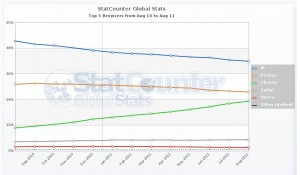Google Chrome Web browser kicks rump, takes names

Internet Explorer (IE) 9 is probably the best Web browser Microsoft ever shipped. Unfortunately for Microsoft fans, it's too little, too late. While Firefox has fallen into the doldrums, Google's Chrome Web browser is slowly, but surely becoming the most popular Web browser of all.
According to Net Applications, Chrome, which just turned three years old, is now up to 15.5% of the market in August 2011. Internet Explorer market share continued its long decline and hit a new low of 55.3 percent from last month's 56 percent. Firefox continued its decline as well and hit 22.6 percent. Apple's Safari browser stayed steady at 4.64 percent. The other Web smaller Web browsers also stayed static.
I strongly suspect that Chrome is going to continue to catch up with IE and Firefox and eventually surpass them both. By year's end, I think Chrome will pass Firefox. It will take until late 2012 for Chrome to surpass IE, but I can see it happening.
If you look beyond the U.S., Chrome is already well on its way. Statcounter had Chrome exceeding 20% of the worldwide Internet browser market in June. Statcounter's numbers already places Chrome ahead of Firefox in some areas of the world.
Royal Pingdom's analysis of Web brower use shows Chrome doing even better in some regions. In South America, Chrome has already left Firefox eating its dust with 33.2% of the market. In some countries, such as Argentina, Chile, Colombia and Uruguay, Chrome is even ahead of IE already the number one Web browser.
Why is Chrome being so successful? Well, first Chrome is just a great Web browser. It's screamingly fast and extremely secure. You can also run it on any PC platform. So, if you have a Mac at home and a Windows PC at the office, you can use the same familiar program.
Another plus for Chrome is that, in part because of Google's support for the Chrome operating system and Chromebooks, there's an application eco-system developing around Chrome applications. Yes, at this point, many Chrome "Apps" are really just fancy Web-site links, but real applications are coming.
In addition, Chrome now has off-line Google applications. These will become available to other HTML-5 enabled Web browsers, but they're first being made available on Chrome. I expect this to have the effect of making Chrome even more attractive to users in the short run.
In the long run, as everyone incorporates real HTML-5 compatibility in their browsers, this won't matter so much. In the long run, though, I also expect most people to be using Chrome for their Web browser both on their PCs and on their Android smartphones and tablets.
Related Stories:
Firefox 6: A Firefox too far? (Review)
